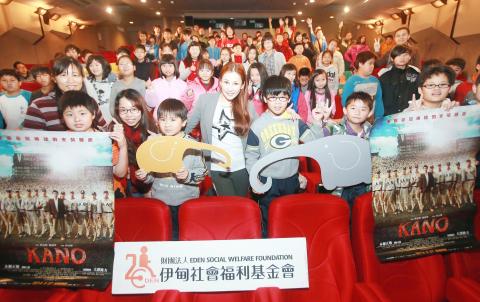The box-office hit Kano has been criticized for “glorifying Japanese colonial rule of Taiwan,” prompting the film’s director to defend his work.
“Let’s leave out the politics. Baseball has universal values. We want to express the idea that ‘Though Taiwan is small, it is strong,’” director Umin Boya (馬志翔) said. “Let’s get reacquainted with ourselves and build up confidence in ourselves.”
The movie has received generally positive reviews, but there have been detractors as well. In recent days, controversy over Kano has boiled over in the media, with some heated discourse.

Photo: Wang Yu-hui, Taipei Times
Earlier this week, the Chinese-language United Daily News and China Times published a letter on the same day, which were signed by one writer surnamed Yen (嚴) and one surnamed Chen (陳), although the contents of the letters were identical. The letters criticized Kano as a distortion of history, sycophantic to the Japanese colonial government and as being made with a Japanese audience in mind.
Over the past two days, a number of netizens have written that the letter was written by Minister of Culture Lung Ying-tai (龍應台) due to the style of writing used and mention of the 1990s civil war in the former Yugoslavia.
When questioned at the Legislature yesterday, Lung denied any involvement with the letter, adding that she was too busy to write to a newspaper.
When asked by lawmakers if she thinks that Kano glorifies Japanese colonial rule, Lung said: “People who write and create their own work must be true to themselves. They should not concern themselves too much with the opinions of the public.”
She added that the ministry handed out NT$75.8 million for Kano’s production because it was made in Taiwan.
Separately yesterday, Boya said that most people thought Taiwanese baseball began in the late 1960s with the rise of the Hongye little league team (紅葉少棒).
Boya told students at a high school in Greater Taichung that Chiayi City’s Kano school team predated the Hongye team.
“They fought against all odds to reach the final of the Japanese high-school Koshien tournament. They did it under very difficult conditions. Unfortunately, the Kano story was not well known... I wanted to direct this movie because it is a heart-warming story,” said Boya, who is from the Sediq Aboriginal community.
The film is based on the true story of a school baseball team from Chiayi City during the 1930s.
“It is all right if you are unsure of your future. Students should always hold on to their sense of curiosity and passion for learning, while following the things they find that are of interest,” Boya said to the students. “When an opportunity arises, you must grasp it and do not let go.”
“It is easy to dream, but to realize your dream can be difficult. You can succeed if you do not give up. Even if the result is not great, you can still be a winner to yourself,” he added.
Kano has earned NT$150 million (US$4.9 million) in Taiwanese theaters since its release two weeks ago.

Chinese Nationalist Party (KMT) Chairman Eric Chu (朱立倫), spokeswoman Yang Chih-yu (楊智伃) and Legislator Hsieh Lung-chieh (謝龍介) would be summoned by police for questioning for leading an illegal assembly on Thursday evening last week, Minister of the Interior Liu Shyh-fang (劉世芳) said today. The three KMT officials led an assembly outside the Taipei City Prosecutors’ Office, a restricted area where public assembly is not allowed, protesting the questioning of several KMT staff and searches of KMT headquarters and offices in a recall petition forgery case. Chu, Yang and Hsieh are all suspected of contravening the Assembly and Parade Act (集會遊行法) by holding

PRAISE: Japanese visitor Takashi Kubota said the Taiwanese temple architecture images showcased in the AI Art Gallery were the most impressive displays he saw Taiwan does not have an official pavilion at the World Expo in Osaka, Japan, because of its diplomatic predicament, but the government-backed Tech World pavilion is drawing interest with its unique recreations of works by Taiwanese artists. The pavilion features an artificial intelligence (AI)-based art gallery showcasing works of famous Taiwanese artists from the Japanese colonial period using innovative technologies. Among its main simulated displays are Eastern gouache paintings by Chen Chin (陳進), Lin Yu-shan (林玉山) and Kuo Hsueh-hu (郭雪湖), who were the three young Taiwanese painters selected for the East Asian Painting exhibition in 1927. Gouache is a water-based

Taiwan would welcome the return of Honduras as a diplomatic ally if its next president decides to make such a move, Minister of Foreign Affairs Lin Chia-lung (林佳龍) said yesterday. “Of course, we would welcome Honduras if they want to restore diplomatic ties with Taiwan after their elections,” Lin said at a meeting of the legislature’s Foreign Affairs and National Defense Committee, when asked to comment on statements made by two of the three Honduran presidential candidates during the presidential campaign in the Central American country. Taiwan is paying close attention to the region as a whole in the wake of a

OFF-TARGET: More than 30,000 participants were expected to take part in the Games next month, but only 6,550 foreign and 19,400 Taiwanese athletes have registered Taipei city councilors yesterday blasted the organizers of next month’s World Masters Games over sudden timetable and venue changes, which they said have caused thousands of participants to back out of the international sporting event, among other organizational issues. They also cited visa delays and political interference by China as reasons many foreign athletes are requesting refunds for the event, to be held from May 17 to 30. Jointly organized by the Taipei and New Taipei City governments, the games have been rocked by numerous controversies since preparations began in 2020. Taipei City Councilor Lin Yen-feng (林延鳳) said yesterday that new measures by